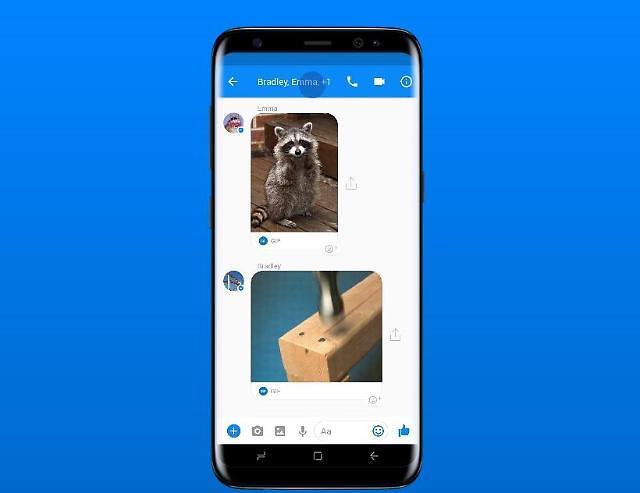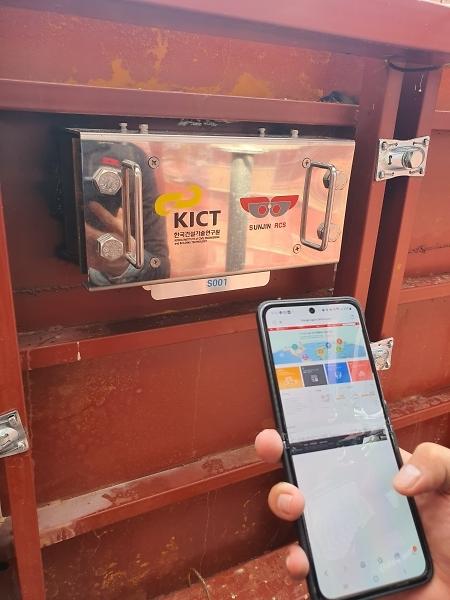
[Courtesy of Samsung]
SEOUL -- South Korea's leading telecom company KT joined hands with Samsung Electronics to launch an enhanced and multimedia-backed chatting platform based on Rich Communication Services (RCS), a communication protocol aimed at replacing the short messaging service (SMS) with large file transferring ability.
From Friday, the new RCS service was applied to Samsung's Galaxy Note 9 phablet phone. To attract clients, KT proposed a free service by June 30, saying Samsung's S9 series would introduce the new service later.
Without having to download apps, smartphone users can engage in group chatting involving up to 100 people, send large files and transfer original photos and videos without image degradation. The service supports KT's AI chatbot solution that would be upgraded gradually to help users place orders and make payments.
RCS is a communication protocol aimed at replacing SMS. In 2016, GSM Association (GSMA), a trade body that represents the interests of mobile network operators worldwide, published the Universal Profile, a single specification for advanced communications.
SMS limits the length of messages to 128 bytes so that they can fit into existing formats. It is still widely favored because the service does not consume data. Many telecom companies support multimedia messaging service (MMS) which can deliver a variety of data including up to 40 seconds of a low-quality video file at a time.
Two other mobile carriers, SK Telecom and LG U+, will follow suit as they did in 2012 to release "joyn", an RCS platform which was shelved quietly due to a chill reception from smartphone users. This time, KT is optimistic, saying the next-generation messaging service would be a global trend in the era of 5G mobile communications.
"We are launching a new generation of messaging services that will bring new value and experience to our customers in the age of 5G," Park Hyun-jin, head of KT's 5G business division, said, adding KT would offer advanced services through 5G video communications services.
The RCS platform works well on the current 4G LTE mobile network. The super-fast speed of 5G mobile networks could help users share large-sized files faster in sending and receiving RCS messages, but such fast and convenient features are already serviced by popular smartphone messenger apps using 4G networks.
The initial reaction from experts was not so positive as they think KT's new service may not sway South Korean smartphone users immersed in Kakao Talk, the country's most popular smartphone messenger app. According to Wiseapp, a market research firm, the number of Kakao's monthly active users stood at 35.28 million, 72.4 percent of total smartphone users, as of May this year.
"The current SMS and MMS ecosystem is outdated and needs a major change. RCS should replace those," wrote Lee8836, a user at South Korean IT community Clien. "The new messaging platform will allow users to receive messages on their phones and other devices in a manner similar to that of Apple's iMessage, but I think the launch of RCS is too late."
Another Clien user nicknamed "secsip1" said: "Though RCS looks like a decent service, the people who developed and approved the platform probably do not think RCS will succeed." kyk7233 agreed, saying a majority of users, especially old people, are already accustomed to using fast and convenient messenger apps.
A different voice came from "bestchoice" who said, "RCS will work fine as long as they unify specifications and standards."
In September, Google and Samsung agreed to release an enhanced RCS platform for Android-based smartphones that allows users to chat in real-time over WiFi and send large data files such as high-definition images and videos.
Samsung and Google have provided native messaging services, but they were not linked. A native service, or a native app, is built into a platform or an operating system (OS). The two companies collaborate to ensure the native messaging services to work seamlessly using RCS technology, including cloud and business messaging platforms.
Apple started its RCS-like iMessage service in 2011, for real-time chat service, multimedia sharing and the transfer of large files. The American tech company is turning iMessage into an integrated multifunctional platform of financial technology and entertainment.
iMessage has captured users, gradually pulling them out from other messenger app services and social media such as Facebook Messenger, Instagram and Snapchat. A 2017 survey of 790 American teenagers aged between 13 and 17, conducted by Chicago University, showed that iMessage is the most favorite messenger app or social media by receiving 76 percent of support.




